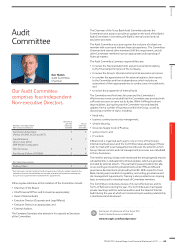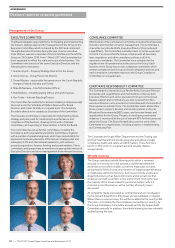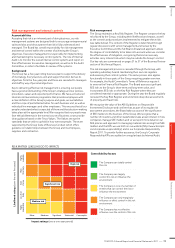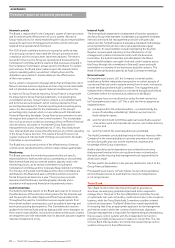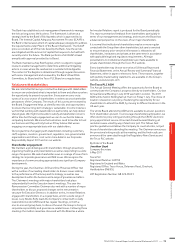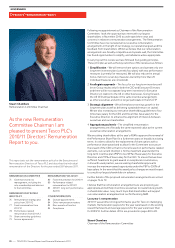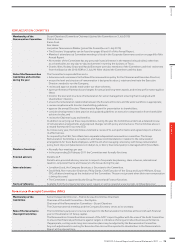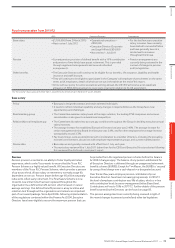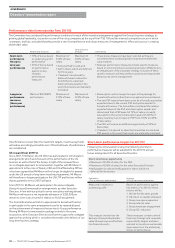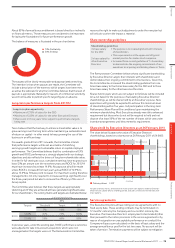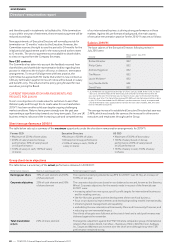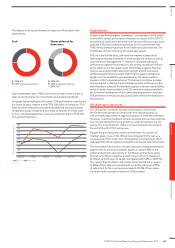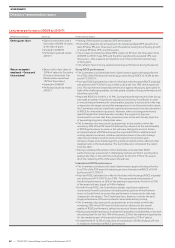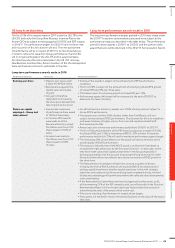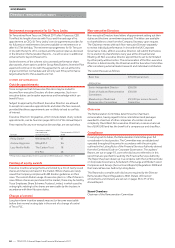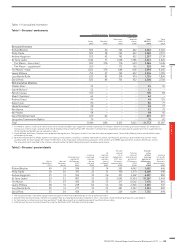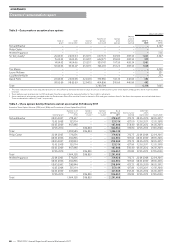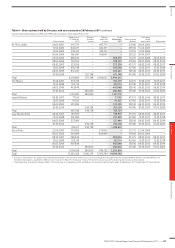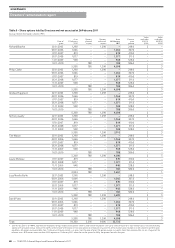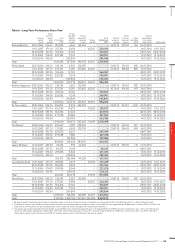Tesco 2011 Annual Report Download - page 83
Download and view the complete annual report
Please find page 83 of the 2011 Tesco annual report below. You can navigate through the pages in the report by either clicking on the pages listed below, or by using the keyword search tool below to find specific information within the annual report.
About 85% of annual bonus entitlement is based directly or indirectly
on financial metrics. These measures are considered to be important
for laying the foundations for future performance growth.
The balance of measures is illustrated in the pie chart below:
30% Strategic
70% Profitability
The targets will be clearly measurable and appropriately stretching.
The intention is that when payouts are made, the Committee will
include a description of the extent to which targets have been met,
as well as the rationale for why the Committee believes that the level of
payouts is appropriate. Naturally for reasons of commercial sensitivity
we will not be able to publish specific target figures in advance.
Long-term performance targets from 2011/12
Long-term plan opportunity
• Maximum of 275% of salary for the CEO
• Maximum of 225% of salary for the other Executive Directors
• Shares vest in three years’ time subject to performance targets
being met
Tesco believes that the best way to enhance shareholder value is to
grow earnings over the long term while maintaining a sustainable level
of return on capital – in other words to keep growing the size of the
business in an efficient way.
For awards granted from 2011 onwards, the Committee intends
that performance targets will be set as a matrix of stretching
earnings growth targets and sustainable return on capital employed
performance. The Committee believes that this combination of EPS
growth and ROCE performance is strongly aligned with our strategic
objectives and also reflects the drivers of long-term shareholder value.
In order for full vesting to occur, cumulative earnings have to grow by at
least 12% per annum over the next three years and ROCE for 2013/14
must have increased to at least 14.6%. No payout at all will be made
unless ROCE is increased from last year’s actual ROCE of 12.9% to
above 13.6% (a 70 basis point increase). For maximum vesting therefore
management is not only required to increase earnings significantly over
the three-year period but also to increase the efficiency of the use of
Group capital.
The Committee also believes that these targets are appropriately
stretching and if they are achieved will have generated significant value
for our shareholders. The vesting matrix and targets are illustrated below:
% of initial award vesting
EPS
Targets Threshold Target EPS
7% 10% 12%
ROCE 14.6% 45% 75% 100%
13.6% 20% 60% 85%
In previous years, under the existing plan, ROCE performance outcomes
were adjusted to take into account acquisitions which were not
envisaged when the targets were set. The Remuneration Committee
reserves the right to make such adjustments under the new plan but
will only do so when the impact is material.
Share ownership guidelines
Shareholding guidelines
4 x base salary
for the CEO
3 x base salary for
other Executive
Directors
• The purpose is to create alignment with interests
of shareholders
• This requirement is at the upper end of typical
market practice for similar sized companies
• Increased from current guideline of 1 x base salary
to demonstrate the ongoing commitment of our
executives to acquiring and holding shares in Tesco
The Remuneration Committee believes that a significant shareholding
by Executive Directors aligns their interests with shareholders and
demonstrates their ongoing commitment to the business. Given this,
the Committee has increased the shareholding guideline from one
times base salary to four times base salary for the CEO and to three
times base salary for the other Executive Directors.
Shares held in plans which are not subject to forfeiture will be included
(on a net basis) for the purposes of calculating Executive Directors’
shareholdings, as will be shares held by an Executive’s spouse. New
appointees will typically be expected to achieve this minimum level
of shareholding within five years. Full participation in the long-term
Performance Share Plan will be conditional upon maintaining the
minimum shareholding. Most Executives already meet this enhanced
requirement but those who do not will be required to hold and not
dispose of at least 50% of the net number of shares which vest under
incentive arrangements until they meet this requirement.
Shares held by Executive Directors as at 26 February 2011
The chart below illustrates the value of Executive Directors’
shareholdings, based on a share price at 26 February 2011 of £4.0605.
32 4
Richard Brasher
Philip Clarke
Andrew Higginson
Tim Mason
Laurie Mcllwee
£s million
Lucy Neville-Rolfe
65 7 8 910
David Potts
Ordinary shares EIP
Includes ordinary shares, and awards of shares and nil cost options made to Directors
which remain subject only to a holding period. Excludes unexercised vested executive
share options.
Service agreements
The Executive Directors all have rolling service agreements with no
fixed expiry date. These existing contracts may be terminated on
12 months’ notice by the Company and six months’ notice by the
Executive. If an Executive Director’s employment is terminated (other
than pursuant to the notice provisions in the service agreement or by
reason of resignation or unacceptable performance or conduct) the
Company will pay a sum calculated on the basis of basic salary and the
average annual bonus paid for the last two years. No account will be
taken of pension. Termination payments will be subject to mitigation
TESCO PLC Annual Report and Financial Statements 2011
—
79
Overview Business review Governance Financial statements


